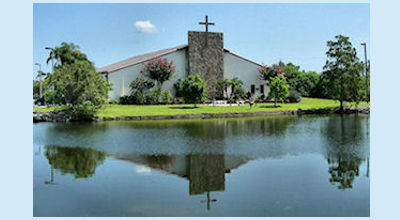Fla. County Board Reverses Decision, Allows Church to Erect Cross
After nearly six years of effort, culminating in a yearlong battle with the zoning board in Charlotte County, Fla., Lutheran Church of the Cross in Port Charlotte will now be able to build a 60-foot monument cross on its 11-acre property. Last week, the Charlotte County Board of Commissioners voted 4-0 to instruct zoning staff to reexamine whether the monument cross should be classified as a “sign” or as a “structure” and “work of art.”
In March, the zoning board denied the church’s request because the board misclassified the freestanding cross as a “sign.” The cross exceeded the acceptable specifications under the inapplicable sign ordinance: 40 feet high and 150 square feet maximum area. The cross as designed is 60 feet high with 2,400 square feet of area.
“Charlotte County’s intransigent classification of the church’s monument cross as a ‘sign’ after expressing concerns about what non-Christians might think of the church’s monument cross exposes the County to liability,” Liberty Counsel wrote in a letter to the Charlotte County Board of Commissioners. “At a minimum, the County’s misclassification and continued delay is a violation of the church’s rights under Florida’s Religious Freedom Restoration Act, the church’s First Amendment rights, and its rights under the Religious Land Use and Institutionalized Persons Act.”
“The Religious Land Use and Institutionalized Persons Act of 2000 has made clear that when evaluating restrictions on the free exercise of religion, only those restrictions that are the least restrictive have the chance of passing constitutional muster,” said Mat Staver, founder and chairman of Liberty Counsel. “When the zoning board classified the cross as a ‘sign’ on the basis that it might offend someone, it imposed an unconstitutional restriction,” Staver said.
“I am thankful that the Charlotte County Commissioners acknowledged that the cross was not a ‘sign,’ but a ‘structure’ as well as a ‘work of art,’ thereby enabling the county to issue Lutheran Church of the Cross a permit to erect a cross on their property. This classification is consistent with other works of art located throughout Charlotte County. I am pleased that the Charlotte County Commissioners made the right decision,” Staver concluded.














































